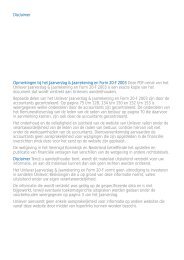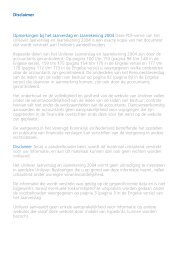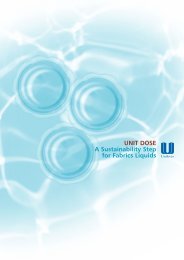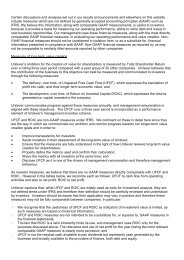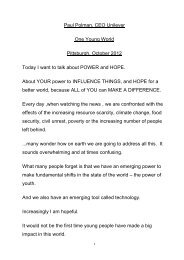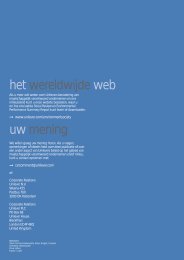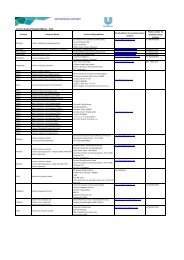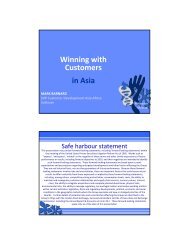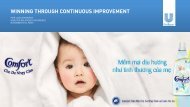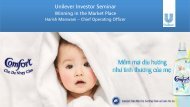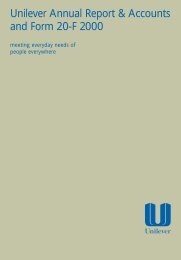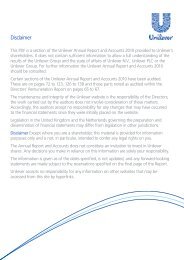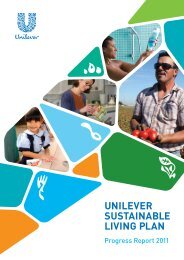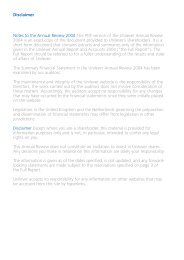Meeting everyday needs of people everywhere - Unilever
Meeting everyday needs of people everywhere - Unilever
Meeting everyday needs of people everywhere - Unilever
Create successful ePaper yourself
Turn your PDF publications into a flip-book with our unique Google optimized e-Paper software.
About <strong>Unilever</strong><br />
History and structure <strong>of</strong> <strong>Unilever</strong><br />
NV and PLC are the two parent companies <strong>of</strong> the <strong>Unilever</strong><br />
Group <strong>of</strong> companies. NV was incorporated under the<br />
name Naamlooze Vennootschap Margarine Unie in<br />
the Netherlands in 1927. PLC was incorporated under the<br />
name Lever Brothers Limited in Great Britain in 1894.<br />
Since 1930 when the <strong>Unilever</strong> Group was formed, NV and<br />
PLC have operated, as nearly as is practicable, as a single<br />
entity. They have the same directors, adopt the same<br />
accounting principles, and are linked by a series <strong>of</strong><br />
agreements. The Equalisation Agreement, which regulates<br />
the mutual rights <strong>of</strong> the two sets <strong>of</strong> shareholders, is<br />
particularly important. It makes the position <strong>of</strong> the<br />
shareholders <strong>of</strong> both companies, as far as possible,<br />
the same as if they held shares in a single company.<br />
(See Control <strong>of</strong> <strong>Unilever</strong> on page 118)<br />
NV and PLC are both public companies, with separate stock<br />
exchange listings and different shareholders. You cannot<br />
convert or exchange the shares <strong>of</strong> one for shares <strong>of</strong> the<br />
other. There is no fixed relationship between the trading<br />
prices <strong>of</strong> their shares – the relative share prices on the<br />
various markets can, and do, fluctuate from day to day and<br />
hour to hour. This happens for various reasons, including<br />
changes in exchange rates. Over time the prices <strong>of</strong> NV<br />
and PLC shares do stay in close relation to each other,<br />
in particular because <strong>of</strong> our equalisation arrangements.<br />
(See Control <strong>of</strong> <strong>Unilever</strong> on page 118)<br />
NV and PLC are holding and service companies. Our<br />
businesses are carried out by our Group companies<br />
around the world. The holding companies have agreed<br />
to co-operate in all areas, to exchange all relevant business<br />
information and to ensure all group companies act<br />
accordingly. In most cases, shares in the group companies<br />
are held ultimately by NV or PLC. The main exception is<br />
that US companies are owned by both – 75% by NV and<br />
25% by PLC. This arrangement is designed to create a<br />
balance between the funds generated by the NV and PLC<br />
parts <strong>of</strong> the Group. (See Control <strong>of</strong> <strong>Unilever</strong> on page 118)<br />
Business structur e<br />
<strong>Unilever</strong> is organised, and its internal results are reported,<br />
on both a product and a regional basis.<br />
On a product basis, Category Directors are responsible for<br />
developing category strategies for implementation across<br />
<strong>Unilever</strong>’s operations and they work closely with Business<br />
Groups to develop regional strategies. They are also<br />
responsible for directing and managing the allocation <strong>of</strong><br />
corporate resources for research and development and the<br />
innovation network.<br />
On a regional basis, <strong>Unilever</strong>’s operations are organised into<br />
twelve Business Groups. These are regionally based with the<br />
exception <strong>of</strong> DiverseyLever, a worldwide grouping <strong>of</strong><br />
pr<strong>of</strong>essional cleaning products and services. Western<br />
Europe and North America are further sub-divided by Foods<br />
and Home & Personal Care product categories.<br />
The individual operating companies, which form the core<br />
building blocks <strong>of</strong> the <strong>Unilever</strong> organisation, come within<br />
the Business Groups. The President <strong>of</strong> each Business Group<br />
is accountable for the performance <strong>of</strong> the companies in<br />
his group. (See Business Group Presidents on page 45)<br />
Description <strong>of</strong> business<br />
<strong>Unilever</strong> is one <strong>of</strong> the world’s leading suppliers <strong>of</strong> fast<br />
moving consumer goods in foods, household care and<br />
personal product categories. It also has other operations,<br />
mainly plantations.<br />
Foods<br />
Oil and Dairy Based Foods and Bakery We are the market<br />
leader in margarine and related spreads in most countries<br />
in Europe and North America. We sell spreads, oils and<br />
cooking fats in more than 50 countries including<br />
Australia, Indonesia, South Africa and Turkey.<br />
In Western Europe and North America, consumer interest<br />
remains strong in spreads <strong>of</strong>fering qualities related to<br />
‘health’ and ‘taste’, although overall consumption in the<br />
sector is declining. Important brands in these markets are<br />
Becel (the Netherlands), Flora (UK), Fruit d’Or (France),<br />
Rama (Germany) and Country Crock and Take Control<br />
(USA). In many other countries, sales <strong>of</strong> spreads are<br />
growing as a result <strong>of</strong> changes in eating habits and<br />
increases in population and personal incomes. We sell<br />
olive oil in a number <strong>of</strong> European countries and North<br />
America under the Bertolli brand name and in France<br />
under the Puget brand.



